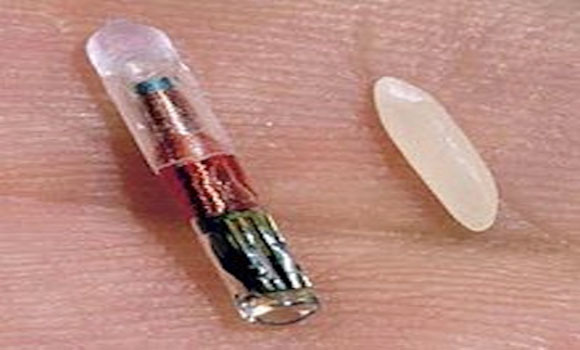Hundreds of thousands of young and old alternative music fans lined up to willingly be tracked with RFID micro-chips at Lollapalooza in Chi-town in Chicago Friday.
The “non-removable wristbands” were provided by organizers for attendees to gain entrance to Lollapalooza music festival in Chicago’s Grant Park, that began Friday August 2nd, according to LibertyFight.com’s Martin Hill, whose article appeared on the Daily Paul website.
For years, innocent targeted individuals (TIs) have seemingly outlandishly complained of being involuntarily covertly micro-chipped, not just by small chips left in personal belongings, but also via “non-removable” injection.
“Hitachi holds the record for the smallest RFID chip, at 0.05mm × 0.05mm,” according to Wkipedia.
Some of those TIs have provided medical evidence of injected RFID chips to courts, such as James Walbert in Kansas.
[See: Secretly forced brain implants, a four-part series]
Some were selected to appear before Obama’s Bioethics Commission where they recounted their miseries.
[Watch on YouTube TI Lisa Becker provide testimony to the Bioethics Commission]
“In what has become a controversial story as time goes on, due to the increasing research into RFID technology, it still remains a little unclear as to exactly why Mythbusters was not able to do a show discussing RFID technology,” says Joe Martino for IntelHub.
At North Dakota State University, “researchers developed a new way of embedding traceable chips within ‘smart’ paper — raising the possibility of banks and governments guarding against counterfeiting and even tracking the usage of paper money,” IEEE Spectru mreporeted in May.
On their website, Lollopalooza festival organizers “put a positive spin on the RFID tags, explaining ‘We’re saving paper and saving you the hassle of redeeming a paper ticket for your wristband!’
A warning was issued to fans that if they removed the wristbands for any portion of the three day event, they were automatically invalidated and can not be re-used. No refunds or replacements are given.
The event warns of their “crack security” team and an infamous “trouble” table if any anomalies are noticed in a wristband, which “will be confiscated” if they appear “messed with.”
Due to overwhelming Missouri TI complaints about RFID implants, the state became the fourth to ban their use on employees.
The Associated Press has reported that “Missouri has passed HB 2041, which makes it a misdemeanor for any employer to ‘require an employee to have personal identification microchip technology implanted into the employee for any reason.’ Radio frequency identification (“RFID”) technology transmits data wirelessly and is usually used to track packages in warehouses or pets.”
Missouri joined California, North Dakota (pdf) and Wisconsin (pdf), both of which also passed legislation forbidding mandatory RFID implantation in humans.
A number of other states are reviewing RFID privacy issues.
Washington state passed a law to prevent “skimming” (unauthorized gathering of data from RFID tags), and California has also debated similar legislation.
Alaska and New Hampshire have also considered legislation and a bill that would create penalties for illegal use of RFID technology, prohibit electronic tracking of individuals without valid court order or consent, and prohibit forced implantation of RFID devices in humans, according to the AP.
Some conceptualize a future where every movement is tracked by the government, says Wikipedia:
“In the book SpyChips: How Major Corporations and Government Plan to Track Your Every Move by Katherine Albrecht and Liz McIntyre, one is encouraged to “imagine a world of no privacy. Where your every purchase is monitored and recorded in a database and your every belonging is numbered. Where someone many states away or perhaps in another country has a record of everything you have ever bought. What’s more, they can be tracked and monitored remotely”.
Others worry that the chip can be used not only for passive information gathering, but is also reversable: Used to send signals to the chipped human.
Incoming search terms:
Add To The Conversation Using Facebook Comments
Source Article from http://feedproxy.google.com/~r/pakalert/~3/KoOxHKvtZ7I/
Views: 0
 RSS Feed
RSS Feed

















 August 6th, 2013
August 6th, 2013  FAKE NEWS for the Zionist agenda
FAKE NEWS for the Zionist agenda 

 Posted in
Posted in 
















